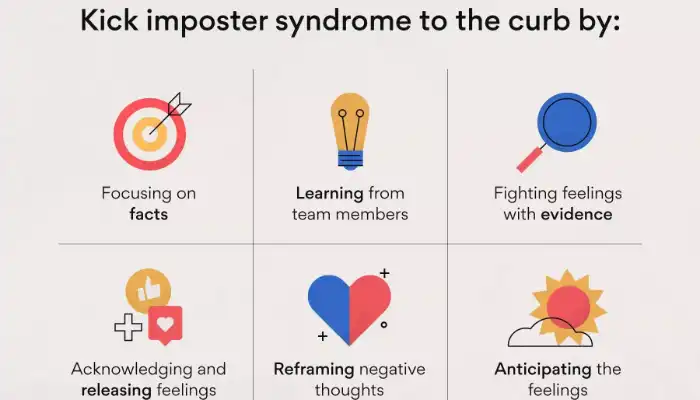How Can You Overcome Imposter Syndrome?

Have you ever achieved something significant yet still felt like a fraud? Do you constantly worry that others will discover you’re not as competent or qualified as they think? If so, you may be experiencing imposter syndrome. This article delves into understanding imposter syndrome, recognizing its signs, and exploring effective strategies to overcome self-doubt and embrace your potential.

The Imposter Within: Defining a Pervasive Phenomenon
Imposter syndrome, also known as imposter phenomenon or fraud syndrome, is a psychological pattern characterized by persistent feelings of inadequacy and self-doubt, despite evidence of success. Individuals experiencing imposter syndrome often believe they are not as competent or qualified as others perceive them to be, and worry about being exposed as a “fraud.”
Surprisingly Common: Research suggests that up to 70% of individuals experience imposter syndrome at some point in their lives, affecting people from all walks of life, regardless of age, gender, profession, or level of experience. While it’s more commonly discussed in academic and professional settings, imposter syndrome can manifest in various facets of life.
Why Address Imposter Syndrome?
Left unchecked, imposter syndrome can have significant negative consequences on your personal and professional well-being. It can lead to:
- Reduced self-confidence and self-esteem
- Increased anxiety and stress
- Decreased motivation and productivity
- Reluctance to take on new challenges or opportunities
- Difficulty accepting praise and recognition
By understanding imposter syndrome and developing strategies to overcome it, you can free yourself from self-doubt, embrace your achievements, and reach your full potential.
Unmasking the Imposter: Recognizing Signs and Symptoms
Imposter syndrome can manifest in various ways, but some common signs and symptoms include:
- Attributing success to luck, external factors, or mistakes going unnoticed
- Downplaying your accomplishments and minimizing your contributions
- Setting unrealistically high standards for yourself and feeling like you never quite measure up
- Constantly comparing yourself to others and feeling inadequate
- Fear of being exposed as a “fraud” or being “found out”
- Experiencing anxiety and self-doubt before, during, and after completing tasks
Factors Contributing to Imposter Syndrome
Several factors can contribute to imposter syndrome, including:
- Childhood experiences: Individuals raised in highly critical environments or with unrealistic expectations may be more prone to self-doubt.
- Personality traits: Perfectionism, high neuroticism, and low self-esteem can increase the risk of imposter syndrome.
- Minority stress: Individuals from underrepresented groups may face additional challenges and societal messages that contribute to feelings of inadequacy.
- Success anxiety: The fear of future failures or the pressure to maintain success can trigger imposter syndrome.
Impact Across Domains: How Imposter Syndrome Affects Your Life
Imposter syndrome can negatively impact various aspects of your life, including:
- Personal life: It can lead to difficulties in relationships, decreased enjoyment of activities, and a reluctance to pursue personal goals.
- Professional life: It can hinder career advancement, limit self-promotion opportunities, and lead to increased job dissatisfaction.
- Academic life: It can decrease academic performance, decrease motivation to participate in class, and lead to avoidance of challenging tasks.
Confronting the Imposter: Recognizing It Within Yourself
The first step to overcoming imposter syndrome is recognizing its presence in your life. Here are some ways to identify if you might be experiencing it:
- Reflect on your internal dialogue: Pay attention to your thoughts and self-talk patterns. Do you frequently engage in negative self-criticism or attribute your successes to external factors?
- Identify self-doubt triggers: Notice what situations or experiences trigger feelings of inadequacy or self-doubt.
- Seek external feedback: Talk to trusted friends, mentors, or colleagues and ask for their honest feedback on your skills and abilities.
Strategies to Overcome Imposter Syndrome
Once you recognize imposter syndrome, you can begin to challenge its hold on you. Here are some effective strategies to overcome it:
- Cultivate self-awareness and self-compassion: Acknowledge your self-doubt, but don’t let it define you. Practice self-compassion and treat yourself with kindness and understanding.
- Set realistic goals and expectations: Strive for excellence, but remember that perfection is unattainable. Set achievable goals and celebrate your progress along the way.
- Celebrate your achievements and successes: Acknowledge and take pride in your accomplishments, both big and small. Don’t downplay your efforts or contributions.
Table 1: Strategies to Overcome Imposter Syndrome
| Strategy | Explanation |
|---|---|
| Cultivate self-awareness and self-compassion | Acknowledge self-doubt but practice kindness and understanding |
| Set realistic goals and expectations | Aim for excellence but accept that perfection is unrealistic |
| Celebrate achievements and successes | Recognize and take pride in accomplishments, big and small |
| Challenge negative thoughts and beliefs | Identify and replace negative self-talk with more positive and realistic statements |
| Seek support from friends, family, or counselors | Talk to trusted individuals or seek professional help if needed |
- Challenge negative thoughts and beliefs: When you experience negative self-talk, challenge the validity of those thoughts. Ask yourself if the evidence supports these beliefs and replace them with more positive and realistic statements.
- Seek support from friends, family, or counselors: Talking to trusted individuals about your struggles with imposter syndrome can provide valuable support and encouragement. Consider seeking professional help from a therapist or counselor if needed.
Conclusion
Remember, overcoming imposter syndrome is a journey, not a destination. Be patient with yourself, celebrate your progress, and embrace the process of building self-confidence and believing in your own potential. You are not an imposter; you are capable and deserving of success. By challenging your self-doubt and embracing your strengths, you can unlock your full potential and achieve your goals.